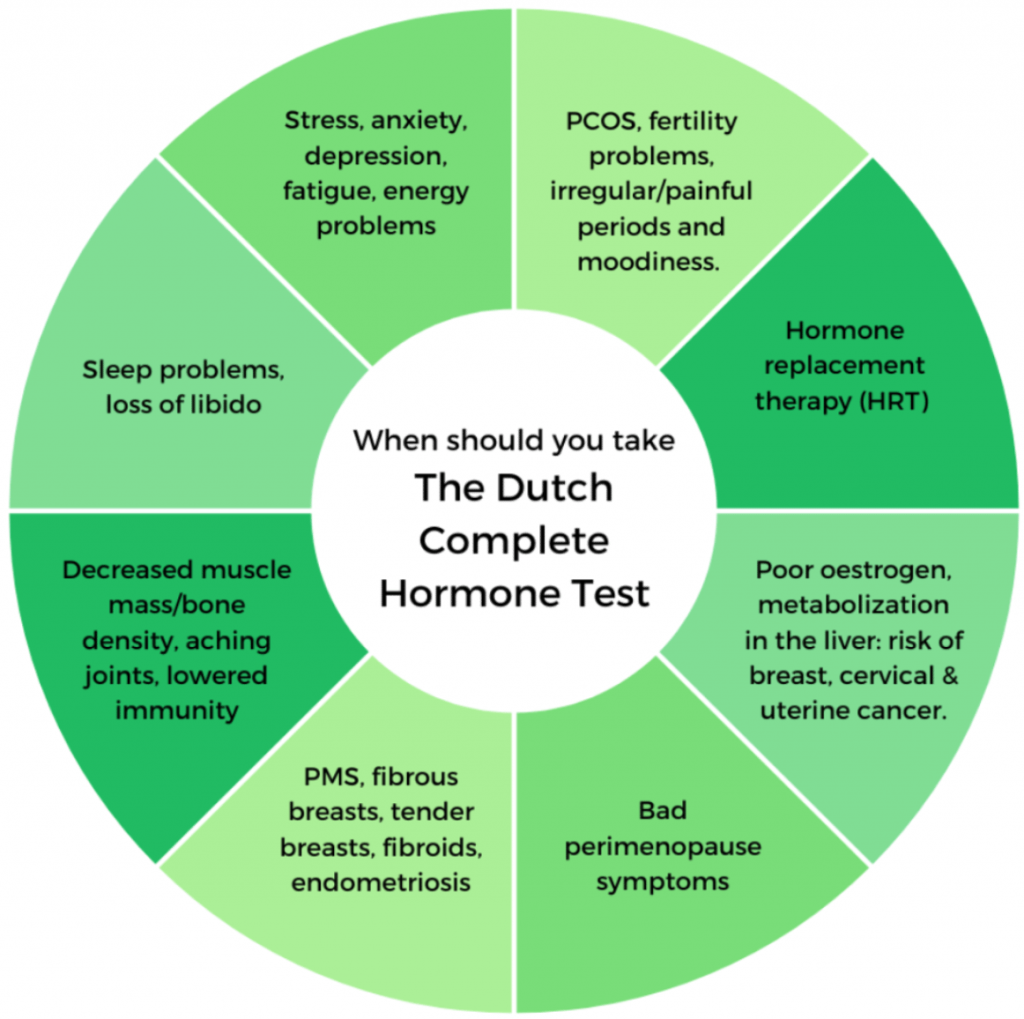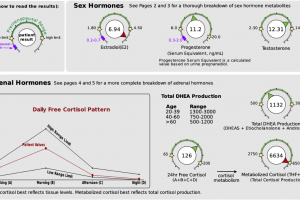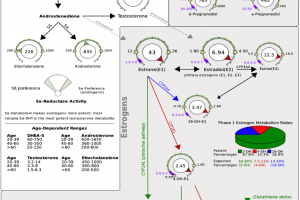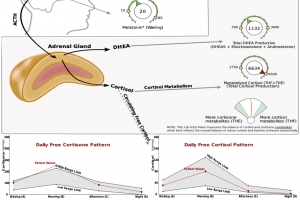DISCOVER MORE ABOUT BALANCING HORMONES
What is Menopause?
Menopause is a natural process that is defined as the point in time when menstrual cycles permanently cease due to the natural depletion of ovarian eggs. With no remaining eggs, the ovaries no longer produce the female sex hormones oestrogen and progesterone at the same level or in the same cycle. It’s the drop in these hormone levels, together with other hormonal changes, as the body adjusts that are responsible for the symptoms of menopause.
The diagnosis is typically made retrospectively after a woman has missed her period for 12 consecutive months, and so marks the permanent end of fertility. For most people in the UK, this occurs between their 40s and 60s with the average age around 51.
The experience of menopause changes from person to person in terms of symptoms and severity.
Our team of menopause specialists can support you in balancing your hormones, so you can reduce your symptoms and feel better.
Menopause Signs & Symptoms
Our expert team of menopause specialists will ask you a variety of questions to understand your experience of menopause.
There are many different symptoms of the menopause, some of which can include:
- Hot flushes and night sweats
- Emotional and psychological disturbances, for example anxiety, depression and irritability
- Problems with memory and concentration
- Vaginal dryness
- Urinary problems
- Loss of libido
- Insomnia
- Headaches
- Joint and muscle pain
Menopause Specialists
Our team of menopause specialists is made up of menopause dietitians and menopause nutritionists, both of which can explore many opportunities to support you through your menopause transition and help to balance your hormones using diet and lifestyle interventions.
Each woman experiences menopause differently, and many different factors can contribute to this experience such as your health history, your current health, your diet as well as your lifestyle.
Hormones have a broad and varied effect on the body. Past history of contraception use and other exogenous interventions may also impact the menopausal transition, which is why symptoms can vary widely from woman to woman.
Conventional treatment is to consider Hormone Replacement Therapy, but the good news is that the symptoms of menopause can be managed with diet, lifestyle support and targeted nutraceutical support.
Hormone balance includes addressing deficiencies through tailoring your nutrition and lifestyle with the aim of reducing your symptoms and improving your health and wellbeing through this time.
Below are some examples of some key areas that our menopause specialists can explore with you to improve your symptoms, and help you feel better:
- Hot Flushes – Vasomotor symptoms, such as hot flushes and night sweats, are some of the most common symptoms of menopause. Our menopause experts may work with you to avoid stimulants such as coffee, alcohol, chocolate and spicy foods, which can help reduce hot flushes. Herbs such as black cohosh, evening primrose oil and phytoestrogens such as flaxseeds, soy and red clover can also be helpful.
- Tiredness – One of the ways our team of menopause specialists may support you is by balancing blood sugar to help to better manage your energy levels. It is beneficial to focus on protein-based snacks like nuts rather than foods high in quick-release sugars such as cakes, biscuits and sweets.
Eating foods that boost your serotonin levels, such as turkey, oats and legumes can also help stabilise your sleep.
Watching your alcohol and caffeine intake can not only help reduce sleep disturbances that lead to tiredness, but also improve bladder control. - Dry Skin – The essential fatty acids (healthy fats) contained in nuts and seeds can help prevent dry skin. Try adding some pumpkin and sunflower seeds to your diet. These contain vitamin E, zinc and calcium which can all be helpful.
- Bone Health – One long-term consequence of menopause and lower oestrogen levels can be a reduction in bone density. Therefore regular exercise including some resistance and weight-bearing exercises can protect against bone density loss. Eating foods that help maintain bone health is also important. Foods high in calcium, magnesium, vitamins D and K, and boron are especially good for this.
Too much phosphorous in the diet accelerates the loss of minerals such as calcium and magnesium from bone. Reducing the amount of protein from animal products and fizzy drinks is important to maintain this balance. - Depression & Irritability – Oestrogen levels also impact our mood. When they drop, your mood can also drop, making you susceptible to depression and irritability. This can be helped by eating foods that can increase your serotonin levels which is considered our ‘feel good’ hormone. These foods include turkey, chicken, salmon, tofu, nuts and seeds.
Erratic blood sugar levels can also have an impact on your mood. Make sure to keep these stable by incorporating proteins and healthy fats into your meals to balance out the release of carbohydrates.
Women are at particular risk of depression while transitioning into menopause.
The NutritionalMatters team works closely with our therapists to help provide coordinated support. If you are interested in arranging therapy, our Client Support team will be happy to arrange this for you in your assessment call. - Phytoestrogens – Phytoestrogens are plant-derived substances that are able to weakly bind to oestrogen receptors in mammals. They have been shown to have a balancing effect on hormones.
Foods such as soya, linseeds, tofu, tempeh and miso, pumpkins seeds, sesame seeds, sunflower seeds, celery, rhubarb and green beans are all high in phytoestrogens.
Research shows that consuming phytoestrogens little and often is more effective than in one large amount.
Cruciferous vegetables such as broccoli, Brussel sprouts, cauliflower and cabbages contain indole-3-carbinol (I3C), a naturally occurring compound which actively promotes the breakdown of sex hormones, such as oestrogen, to beneficial metabolites. Other antioxidants and phytonutrients that can influence healthy oestrogen metabolism include curcumin, vitamins E and C and selenium
WEIGHT LOSS THROUGH THE MENOPAUSE
During and after menopause, muscle mass can reduce which means you may need fewer calories to ‘run’ your body. If you are eating the same amount of calories, but fewer are needed, the excess calorie intake may lead to gradual weight gain. Be aware of your portion sizes and aim to exercise regularly to protect your muscle mass.
Eating protein rich foods such as eggs, poultry, nuts, tofu and legumes regularly can also help prevent muscle loss.
Low levels of oestrogen affects how the body metabolizes carbs and fats, and can also cause a very stubborn type of weight gain that often happens during the menopausal period. The ovarian cells no longer produce oestrogen, so the body starts looking for oestrogen elsewhere. One source is fat cells. The body may start converting extra energy sources into fat, leading to weight gain, particularly around the abdomen.
Our team of menopause weight loss specialists can help to create a balanced diet and lifestyle plan that includes foods to nourish your body during the menopause and support you in finding the right portion sizes.
Functional Testing
Hormone testing, and a functional medicine perspective to your health, allows us to be more targeted in the support we provide you.
Learning how and when you ovulate, the length of your cycle and the status of your hormones can help our team of hormone specialists in creating personalised nutrition and lifestyle interventions.
The outcome is to help you reduce your symptoms, rebalance your hormones, to achieve your health goals and feel better.
How Can Testing Help Me?
Depending on the symptoms you are presenting with and how far through the menopause transition you are, will depend on which tests may be beneficial for you.
If you are in the earlier stages of perimenopause and experiencing hormonal symptoms testing can help to understand the status of your hormones and help to target specific and personalised nutritional and lifestyle interventions, to restore balance and help you achieve your health goals.
Functional hormone testing helps us identify the root causes of hormonal imbalances in both men and women. It can also help provide useful insights into perimenopause and menopausal symptoms, PCOS, weight gain, fatigue, low libido, premenstrual symptoms and more.
We are always aiming to get to the root cause of your hormonal imbalance, so test results are considered alongside your presenting signs and symptoms, as well as current diet and lifestyle patterns.

How Can Testing Help Me?
Functional Testing can give a detailed insight into exactly how your hormones are functioning, assessing sex hormones and stress hormones such as:
- Cortisol
- Cortisone
- Estradiol
- Estrone
- Estriol
- Progesterone
- Testosterone
- DHEA and DHEA-S
- Melatonin
What Sample Do You Need?
Hormones can be tested in blood, urine and saliva and each sample type provides different information. Our hormone specialists will discuss the options available, and recommend the ones most suited to the symptoms and health picture you are presenting with.
- Blood profiles may be available from your GP and we always aim to work alongside your medical team. They can also be run privately if necessary.
- Saliva samples enable us to measure the bioavailable fraction of the hormone and is useful for taking multiple samples like tracking the daily circadian rhythm of cortisol in an Adrenal Stress Profile.
- The gold standard test for a full hormone panel uses urine samples, which can be done from the comfort of your own home.
The DUTCH Profile
One of the most comprehensive hormone profiles available is the DUTCH Profile which utilises a urine sample to look at hormone pathways and the metabolites – how the body has processed hormones through the liver.
Metabolism and excretion of hormones is an important, and sometimes overlooked, part of hormone balance – and ties into gut function.
The results from the DUTCH Profile provide a detailed insight into the main hormones, including progesterone, oestrogen and its metabolites, as well as the androgens including testosterone and DHEA, and the stress hormones cortisol and cortisone.
Click on the boxes below to see some sample reports from the DUTCH profile. This gives you an idea of the depth and breadth of information functional testing can provide.
DUTCH Cycle Mapping
Depending on where you are in your menopause journey, the DUTCH Cycle Mapping profile maps the progesterone and oestrogen pattern throughout the menstrual cycle.
DUTCH Cycle Mapping with Complete provides the full picture of a woman’s cycle to answer important questions for patients with month-specific symptoms, infertility and hormone imbalances.
Our menopause specialists can discuss with you whether this would be useful profile for you based on your current symptoms.
BOOK A CALL WITH OUR FRIENDLY ASSESSMENT TEAM
Please check Our Fees page before booking a call.
Choose a day and time that works for you.
Tell us what is going on for you.
Let us explain how we can help.
FAQs
Here are some frequently asked questions about weight loss treatment with our weight loss specialists.
Everyone is different, and the number of consultations can depend on the length of time you have had symptoms, how motivated you are for change, and how regularly you want your sessions. On average we recommend an initial consultation and 2 to 3 follow-up sessions over a 3 month period. Many of our clients choose one of our Online Health Packages.
Yes, certainly. Your hormone specialist will take a detailed health history and assessment of your current medications and supplements during the initial consultation, and will take this into consideration when suggesting any hormone testing, and when interpreting your results.
No, we do not prescribe medications. At the HealthMatters Group we are a team of nutritional therapists and dietitians, and work using nutritional and lifestyle modifications, as well as working with supplements and functional testing. If you have been prescribed HRT by an endocrinologist or functional medicine doctor, our team of hormone experts can work closely with them to support any changes to your diet or lifestyle.
Our prices vary depending on which practitioner you see and the length of the consultation. We like to be transparent about our fees, and you can take a look here.
Our menopause clinic is based at the King Edward VII Hospital, however most of our practitioners work remotely online.. This means we can support you wherever you are in the world.
NEXT STEPS
If you resonate with any of these symptoms and would like some support, please book a complimentary call with our friendly assessment team.
They will talk through your health goals and symptoms, and recommend one of our nutrition team that specialises in balancing hormones.



